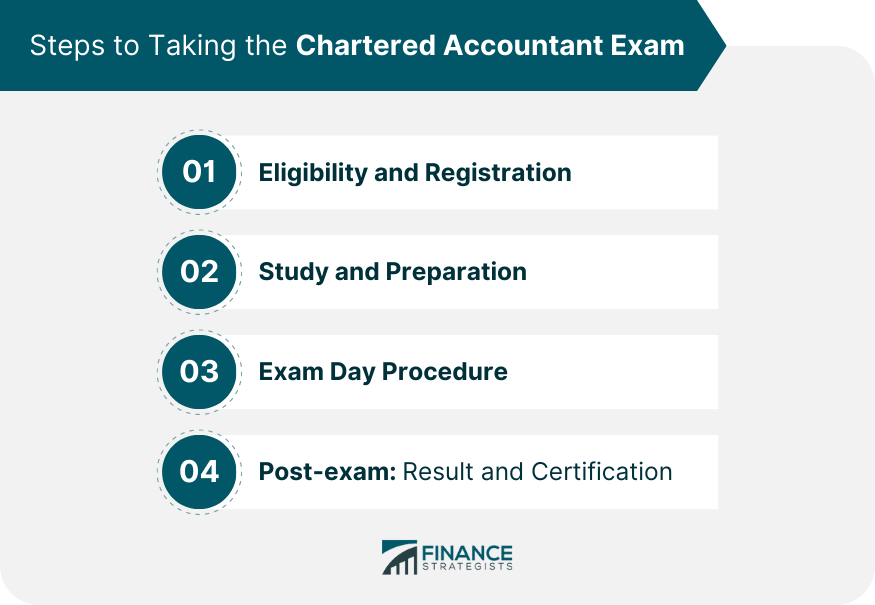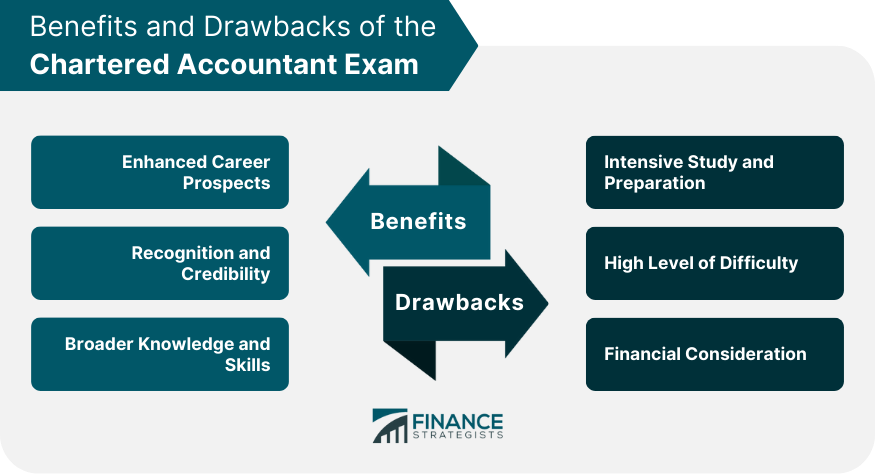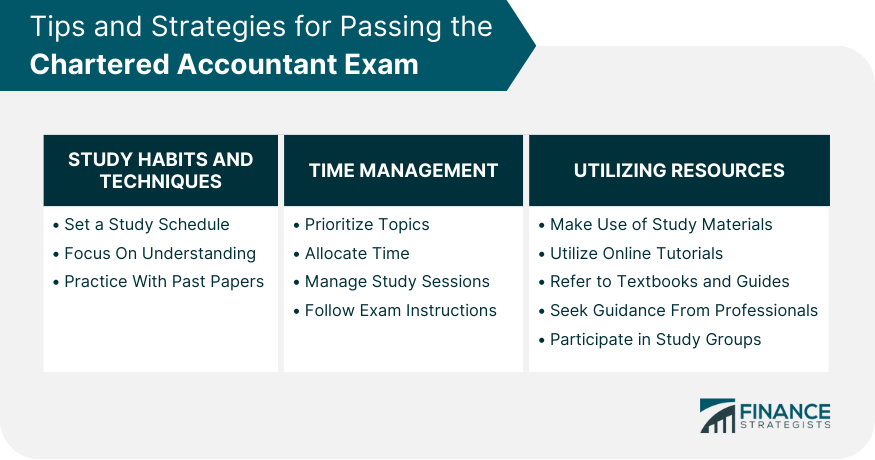The Chartered Accountant (CA) exam is a rigorous certification test undertaken by accounting and finance professionals. The test is administered by accounting bodies across the globe, including the Institute of Chartered Accountants in England and Wales (ICAEW), the Canadian Institute of Chartered Accountants (CICA), and the Institute of Chartered Accountants of India (ICAI). Passing this exam is a key requirement in achieving the Chartered Accountant designation, a globally respected professional credential in finance and accounting. The purpose of this exam is manifold. It is designed to test the comprehensive understanding of the candidate in various aspects of finance and accountancy. This includes areas such as financial management, auditing, taxation, and business strategy. The importance of this exam lies in its role in maintaining the professional standard of the accounting industry. By setting a high bar for achieving the designation, the exam ensures that Chartered Accountants have the knowledge and skills to meet the demands of their roles. The Chartered Accountant Exam typically consists of several papers covering a range of accounting, finance, and business topics. The number and nature of these papers can vary depending on the specific accounting body, but most include sections on financial accounting, management accounting, business law, and taxation. The format may comprise multiple-choice questions, short-answer questions, and extended-response or essay questions. The exams can span several days and require extensive preparation. Each paper of the Chartered Accountant Exam is marked independently, with a pass or fail awarded for each section. In general, candidates must achieve a minimum percentage, typically around 50%, to pass each paper. After all papers are marked, an overall grade is determined. Candidates usually have the opportunity to re-sit individual papers if they do not achieve a pass on their first attempt. To sit for the Chartered Accountant Exam, one must meet specific eligibility requirements. These vary by accounting body but generally include a combination of education and experience prerequisites. For instance, candidates may need a bachelor's degree in a related field and a certain amount of supervised work experience in accounting. Upon meeting these requirements, candidates can register for the exam with their respective accounting bodies. The next step is to study and prepare for the exam. This requires a significant investment of time and effort, often over several months or years. Candidates generally need to cover a large volume of material and practice answering exam-style questions. Many candidates join study groups, hire tutors, or use online resources to help with their preparation. On exam day, candidates must adhere to specific procedures set by their accounting bodies. This includes reporting to the exam venue at the correct time, bringing the necessary identification and materials, and following the rules for answering and submitting their papers. After the exam, candidates receive their results and, if successful, their certification. The timeline for this can vary but is typically within a few weeks of the exam. Those who pass become Chartered Accountants, a status that opens up a range of career opportunities. Passing the Chartered Accountant Exam significantly enhances one's career prospects. Chartered Accountants are sought after by employers in all sectors, from finance and banking to government and non-profit organizations. They are eligible for roles that require advanced accounting knowledge and can command higher salaries than their non-chartered counterparts. Achieving the Chartered Accountant designation brings with it recognition and credibility. It is a globally recognized credential that demonstrates a high level of professional competence. This recognition can help when seeking employment or promotion, as well as in interactions with clients or other professionals. Passing the exam also signifies that you have a broad understanding of various aspects of finance and accounting beyond just technical skills. It reflects comprehension of business strategy, laws related to the business, and ethical conduct, making you a valuable asset to any organization. One of the main drawbacks of the Chartered Accountant Exam is the intensive study and preparation it requires. This can be time-consuming and stressful, particularly for those balancing other commitments, such as work or family. The Chartered Accountant Exam is known for its high level of difficulty. The content is complex, and the exam itself is long and grueling. Not everyone passes on their first attempt, and many candidates need to re-sit one or more papers. Taking the Chartered Accountant Exam also involves a significant financial investment. This includes fees for the exam itself, as well as costs related to study materials, courses, or tutors. Developing effective study habits and techniques is crucial. This involves setting a study schedule that suits your learning style and preferences. Allocate dedicated time for each subject and create a structured study plan. Instead of merely memorizing information, focus on understanding the underlying concepts. This will enable you to apply your knowledge effectively during the exam. Additionally, practicing with past exam papers is invaluable, as it familiarizes you with the format and helps you identify areas that require further attention. Time management plays a critical role in both the preparation phase and the exam itself. While studying, prioritize topics based on their weightage and your level of understanding. Break down your study sessions into manageable chunks, allowing for regular breaks to maintain focus. During the exam, carefully read the instructions and allocate time for each section based on the number of questions and their difficulty level. Sticking to the allocated time ensures that you have ample opportunity to address all sections and maximize your score. Candidates should make the most of the resources available to them. Accounting bodies often provide study materials that are designed to align with the exam syllabus. These materials offer comprehensive coverage of the subject matter and can serve as a valuable resource during preparation. Additionally, online tutorials, textbooks, and reference guides can supplement your understanding of complex topics. Participating in study groups or seeking guidance from experienced professionals or tutors can provide valuable insights and clarify any doubts you may have. the Chartered Accountant Exam is a rigorous certification test that accounting and finance professionals undertake to achieve the globally respected Chartered Accountant designation. This exam assesses candidates' comprehensive understanding of various aspects of finance and accountancy, including financial management, auditing, taxation, and business strategy. Passing the exam offers numerous benefits, such as enhanced career prospects, recognition, credibility, and a broader knowledge base beyond technical skills. However, the exam comes with challenges, including the need for intensive study and preparation, the high level of difficulty, and the financial investment required. To succeed, candidates should develop effective study habits and techniques, manage their time wisely, and utilize available resources such as study materials, online tutorials, and practice exams. By following these tips and strategies, candidates can increase their chances of passing the exam and open up exciting opportunities in the field of finance and accounting.What Is the Chartered Accountant Exam?
How the Chartered Accountant Exam Works
Format and Components
Grading Process
Steps to Taking the Chartered Accountant Exam
Eligibility and Registration
Study and Preparation
Exam Day Procedure
Post-exam: Result and Certification

Benefits of Passing the Chartered Accountant Exam
Enhanced Career Prospects
Recognition and Credibility
Broader Knowledge and Skills
Drawbacks of the Chartered Accountant Exam
Intensive Study and Preparation
High Level of Difficulty
Financial Consideration

Tips and Strategies for Passing the Chartered Accountant Exam
Study Habits and Techniques
Time Management
Utilizing Resources

Final Thoughts
Chartered Accountant Exam FAQs
The Chartered Accountant Exam is a rigorous certification test undertaken by accounting and finance professionals to achieve the globally respected Chartered Accountant designation.
The exam typically includes components such as financial accounting, management accounting, business law, taxation, audit and assurance, financial management, and business strategy.
Passing the exam enhances career prospects, offers recognition and credibility, and signifies a broader understanding of finance and accounting beyond technical skills.
Yes, the Chartered Accountant Exam is known for its high level of difficulty. It requires intensive study, covers complex content, and often requires candidates to re-sit one or more papers.
Effective study habits and techniques, time management, utilizing available resources, practicing with past exam papers, and seeking guidance from experienced professionals or tutors are key tips for success in the exam.
True Tamplin is a published author, public speaker, CEO of UpDigital, and founder of Finance Strategists.
True is a Certified Educator in Personal Finance (CEPF®), author of The Handy Financial Ratios Guide, a member of the Society for Advancing Business Editing and Writing, contributes to his financial education site, Finance Strategists, and has spoken to various financial communities such as the CFA Institute, as well as university students like his Alma mater, Biola University, where he received a bachelor of science in business and data analytics.
To learn more about True, visit his personal website or view his author profiles on Amazon, Nasdaq and Forbes.















